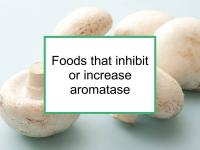Aromatase inhibitors such as anastrozole (Arimidex), letrozole (Femara), and exemestane (Aromasin) suppress the production of estrogen within the body by inhibiting the action of the enzyme aromatase (which converts androgens into estrogens). There are also some foods that inhibit aromatase naturally and others that increase it.
The growth of ER+ (i.e., estrogen sensitive) breast cancer is promoted by estrogen. Decreasing the production of estrogen with an aromatase inhibitor is designed to reduce recurrence. We cover foods that affect aromatase or influence the treatment effects of aromatase inhibitors in Foods to eat & avoid during aromatase inhibitor treatment.
Below we list foods incorporating significant levels of compounds known to inhibit or promote aromatase activity. Note that a few of the foods (for example, orange peels) should not be consumed during aromatase inhibitor treatment. The purpose of the list is to provide useful information to women who would benefit from aromatase inhibitor treatment, but are unable to undergo it or other anti-estrogen treatment.
Foods that inhibit aromatase activity
The following foods contain compounds that have been shown to inhibit aromatase activity, thereby suppressing estrogen biosynthesis:
- Apples - especially the peel
- Artichokes
- Arugula
- Basil
- Blackberries
- Black tea
- Blueberries & bilberries
- Boysenberries
- Broccoli & broccoli sprouts
- Brussels sprouts
- Buckwheat
- Cabbage & bok choy
- Cauliflower
- Celery & celery seed
- Cherries, especially sour or tart
- Chili powder
- Chives
- Cilantro
- Collard greens
- Cranberries & lingonberries
- Currants, black or red
- Grapes, red, black or muscadine
- Green onions
- Green tea
- Honey, minimally processed
- Horseradish & wasabi
- Hot peppers
- Hot sauce
- Kale
- Lemons
- Mexican oregano
- Mushrooms, white button & related
- Mustard
- Mustard greens
- Oranges & tangerines
- Oregano
- Parsley
- Passion fruit
- Pistachio nuts
- Pomegranates & pomegranate juice
- Radicchio
- Radishes
- Raspberries
- Rice, black or red
- Romaine lettuce
- Rosemary
- Saffron
- Sweet potatoes
- Thyme
- Turmeric
- Turnip greens
- Turnips
- Walnuts & walnut oil
- Watercress & garden cress
- Watermelon
Please read the applicable food webpages when making your own food lists since these pages contain important advice, food rankings (e.g., highly recommended, recommended in moderation), consumption limits, and other pertinent information.
Foods that increase aromatase activity
The following foods contain compounds that have been shown to increase aromatase activity, thereby increasing the production of estrogen. They should be limited or avoided by those with ER+ breast cancer.
Sources of information provided in this webpage
The food lists above, which are updated continually as new research becomes available, have been developed based solely on the results of academic studies. Clicking on any of the foods will take you to its webpage, which contains specific information concerning that food's relationship to breast cancer, including its overall recommendation, as well as links to supporting studies.
Please see our article on aromatase inhibitors for more information.
